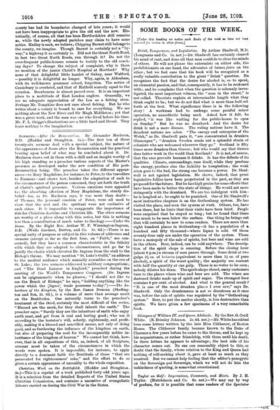Saamoss. — After the Resurrection. By Alexander Maclaren, D.D. (Hodder and Stoughton.
5s.)—The first ten of these twenty-six sermons deal with a special subject, the nature of the appearances of Jesus after the Resurrection and the practical hearing upon belief of what may be concluded about it. Dr. Maclaren draws out in them with a skill and an insight worthy of his high standing as a preacher various aspects of the Master's presence as developed under the new condition of His post- Resurrection being. The preacher .takes the different appear- ances—to Mary Magdalene, for instance, to Peter, to the travellers to Emmaus—and shows how, besides the adaptation of each to the circumstance of the person concerned, they set forth the truth of Christ's spiritual presence. Various emotions were appealed to : the absorbing affection of Mary Magdalene, the sturdy dis- belief—for, as Dr. Maclaren says, it was more than doubt— of Thomas, the personal emotion of Peter, were used to show that the real and, the spiritual were not exclusive of each other. It is impossible to exaggerate the importance of this for Christian doctrine and Christian life. The other sermons are worthy of a place along with this series, but this is nothing less than a contribution of much value to theology.— Under the Dome. By the Right Rev. Arthur W. F. Winnington-Ingram, D.D. (Wells Gardner, Darton, and Co. 3s. 6d.)—There is no special unity of purpose or subject in this volume of addresses and rermons (except so far as the first four, on " Faith," are con- cerned), but they have a common characteristic in the felicity with which they are adapted to circumstances, and go far to justify the choice which elevated Dr. Ingram from the stall to the Bishop's throne. We may mention " St. Luke's Guild," an address to the medical audience which annually assembles on the eve of St. Luke; the two sermons addressed to military congregations ; and. "The Dead Lazarus in England," preached during the meeting of the World's Temperance Congress. (Dr. Ingram can be epigrammatic when he pleases ; " I should not like to see the Bench of Bishops," he says, " holding anything like the power which the [liquor] trade possesses to-day.")—The In- heritors of the Kingdom, by the Rev. Canon Duncan (Skeffing- ton and Son, 2s. 6d.), is a volume of more than average merit on the Beatitudes. One naturally turns to the preacher's • treatment of the third, certainly the most difficult of the series, "Blessed are the meek, for they shall inherit the earth." The preacher says: " Surely they are the inheritors of earth who enjoy earth most, and get from it real and lasting good ; who use it according to the testator's will, soberly, righteously, and profit- ably, making it a blessed and sanctified means, not only of doing good, and so furthering the influence of the kingdom on earth, but also of preparing the soul for the incomparably nobler in- heritance of the kingdom of heaven." We cannot but think, how- ever, that in all expositions of this, as, indeed, of all Scripture, account must be taken of the circumstances in which the words were spoken. It is impossible, for instance, to apply directly to a dominant faith the Beatitude of those " that are persecuted for righteousness' sake," and the effort to do so gives a certain appearance of unreality to the whole exposition.


















































 Previous page
Previous page